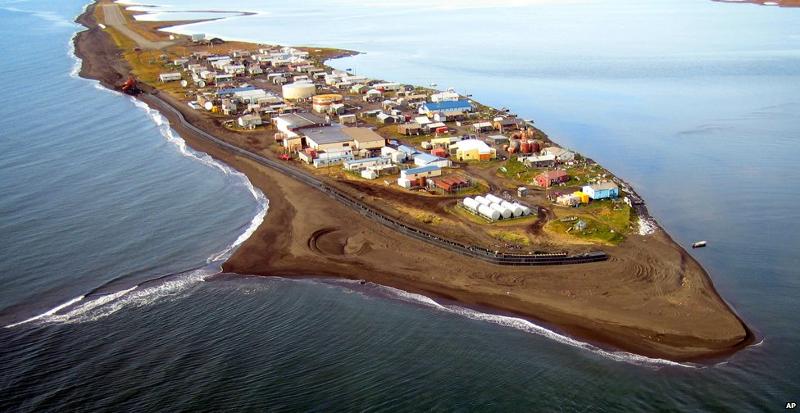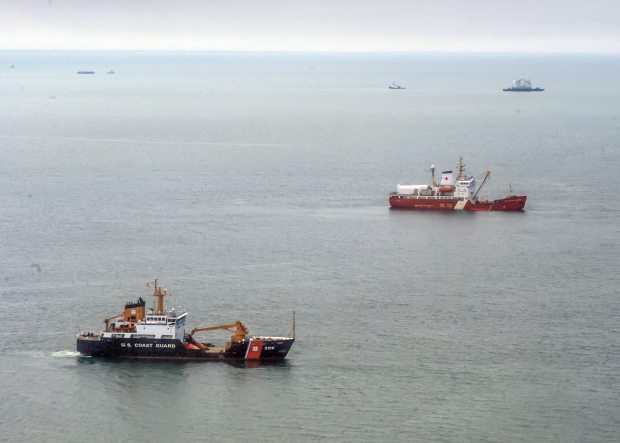|
|
|
|
|
|
|
|
Alaska Forum on the Environment, February 8-12, 2016 (Anchorage, Alaska, USA). The Alaska Forum on the Environment (AFE) is Alaska's largest statewide gathering of environmental professionals from government agencies, non-profit and for-profit businesses, community leaders, Alaskan youth, conservationists, biologists and community elders. The diversity of attendees and comprehensive agenda sets this conference apart from any other. Each year there are over 80 technical breakout sessions and Keynote Events. There will be a full week of sessions on climate change, energy, environmental regulations, cleanup and remediation, fish & wildlife, solid waste, and more.
Today's Congressional Action:
The Senate is expected to consider several legislative items include in the nomination of Azita Raji, of California, to be Ambassador Extraordinary and Plenipotentiary of the United States of America to the Kingdom of Sweden; and Samuel D. Heins, of Minnesota, to be Ambassador Extraordinary and Plenipotentiary of the United States of America to the Kingdom of Norway. The House will consider non-Arctic legislation.
|
For the First Time, Researchers Have Documented Algae-Related Toxins in Arctic Sea Mammals. Toxins produced by harmful algal blooms are showing up in Alaska marine mammals as far north as the Arctic Ocean -- much farther north than ever reported previously, new study published Thursday finds. The study, by scientists at the National Oceanic and Atmospheric Administration, the Alaska Department of Fish and Game and other organizations, details findings from a decade's worth of sampling of 13 marine mammal species in Alaska. Alaska Dispatch News
 Behind Obama's $400 Million Budget Request to Relocate Entire Alaska Villages. When President Barack Obama visited Alaska last summer, he did not stop in tiny Kivalina, a village of about 400 that has become a poster child for climate vulnerability. But he did fly over it, and the view from Air Force One revealed just how exposed the community truly is. Located on a thin barrier island well above the Arctic Circle, and facing severe erosion as declining sea ice exposes its coast to large waves, Kivalina needs to relocate -- which could cost well over $100 million. And now, Obama's budget request to Congress includes a proposed $400 million "to cover the unique circumstances confronting vulnerable Alaskan communities, including relocation expenses for Alaska Native villages threatened by rising seas, coastal erosion, and storm surges." Alaska Dispatch News Behind Obama's $400 Million Budget Request to Relocate Entire Alaska Villages. When President Barack Obama visited Alaska last summer, he did not stop in tiny Kivalina, a village of about 400 that has become a poster child for climate vulnerability. But he did fly over it, and the view from Air Force One revealed just how exposed the community truly is. Located on a thin barrier island well above the Arctic Circle, and facing severe erosion as declining sea ice exposes its coast to large waves, Kivalina needs to relocate -- which could cost well over $100 million. And now, Obama's budget request to Congress includes a proposed $400 million "to cover the unique circumstances confronting vulnerable Alaskan communities, including relocation expenses for Alaska Native villages threatened by rising seas, coastal erosion, and storm surges." Alaska Dispatch News
Whaling Commission Wraps Up Convention. Village allocations, strikes, and regulatory concerns were top priorities for the Alaska Eskimo Whaling Commission at its annual whaling captains' meeting which wrapped up Feb. 5 in Barrow. Each year, the commission holds one weeklong convention and four quarterly meetings to discuss current trends, restrictions, and parameters for whaling in its communities. The Arctic Sounder
Polar Research Museum to be Opened in Moscow. Moscow authorities plan to open a polar research museum, said Artur Chilingarov, special presidential representative for international cooperation in the Arctic and Antarctic, RIA Novosti reports. "My aim is to open a polar research museum in Moscow using extra-budgetary sources. I'm working on that, and I'm sure that this museum will be opened. We already have the expositions," Chilingarov said. The Arctic
 Future of Heavy Fuel Oil in Arctic Waters Challenged. A group of nongovernmental organizations recently sent a letter to the US Department of State calling for a ban on heavy fuel oil, or HFO, in Arctic waters. HFO is hard to cleanup, but the widespread use of HFO throughout the Arctic makes the ban an especially hard sell. In the Arctic, HFO is used in both big and small ways. It fuels large cargo ships and helps heat and power homes in Canada and Russia. It's banned in Antarctic waters and in northern Europe, partly due to its dirty emissions. It's also hard to clean up. Alaska Public Radio Future of Heavy Fuel Oil in Arctic Waters Challenged. A group of nongovernmental organizations recently sent a letter to the US Department of State calling for a ban on heavy fuel oil, or HFO, in Arctic waters. HFO is hard to cleanup, but the widespread use of HFO throughout the Arctic makes the ban an especially hard sell. In the Arctic, HFO is used in both big and small ways. It fuels large cargo ships and helps heat and power homes in Canada and Russia. It's banned in Antarctic waters and in northern Europe, partly due to its dirty emissions. It's also hard to clean up. Alaska Public Radio
|
Legislative Action
No Arctic legislation was formally considered yesterday.
|
|
Future Events
ARCUS DC Arctic Research Seminar Series, February 18, 2016 (Washington, DC). Does it seem as though the weather gods have gone crazy lately? It is not your imagination. The question on everyone's minds is why? And is it related to climate change? In this presentation, I will explain new research that links increasing extreme weather events with the rapidly warming and melting Arctic during recent decades. Evidence suggests that Arctic warming is causing weather patterns to become more persistent, which can lead to extremes such as droughts, cold spells, heat waves, and some flooding events.
5th Annual Fletcher Opening Arctic Conference, March 12, 2016. The Opening Arctic Conference builds on the Fletcher School's Warming Arctic International Inquiry series, to bring together high-level thought leaders from across disciplines, Fletcher's hallmark. Staged annually, Fletcher's event continues to address the foreign policy, economic, environmental and security implications of the opening Arctic, while dispelling myths.
15th Annual Arctic Health Science Seminar, April 1, 2016 (Anchorage, Alaska, USA). The American Society for Circumpolar Health will host the 15th Annual Arctic Health Science Seminar in Anchorage, Alaska. This event will include the annual meeting of the American Society for Circumpolar Health, the Robert Fortuine Memorial lecture, and the Albrecht Milan Foundation will provide the Albrecht-Milan Emerging Professional Award to one of the Arctic Health Science Seminar presenters. The call for abstracts is open through Monday February 29, 2016.
** New this week** The American Arctic: The United States as an Arctic Power in Science, Technology and Security, April 4, 2016 (San Francisco, CA, USA). The Association of American Geographers will host a panel discussion on the American Arctic. In 2015 the United States assumed the chairmanship of the Arctic Council. In recent years, the Federal government began to pay closer attention to the Arctic owing to dramatic environmental and social changes and growing economic interest in the region's vast resources. President Obama became the first sitting US President to visit the Arctic this August. US Arctic Research Commission Chair Fran Ulmer is expected to be a panelist.
Alaska Rural Energy Conference, April 26-28, 2016 (Fairbanks, Alaska, USA). The Alaska Rural Energy Conference is a three day event offering a large variety of technical sessions covering new and ongoing energy projects in Alaska, as well as new technologies and needs for Alaska's remote communities. Building on the growing success, the Alaska Energy Authority and the Alaska Center for Energy and Power have joined forces again to organize and sponsor the 10th annual Alaska Rural Energy Conference.
14th IATS Seminar, June 19-25, 2016 (Bergen, Norway). The University of Bergen (UiB) is honored to host the 14th IATS Seminar in Bergen, Norway, from Sunday 19 to Saturday 25 June 2016 in co-operation with the Network for University Co-operation Tibet-Norway, an academic network with the universities of Oslo, Bergen and Tromsų as partners. The convenor is Professor Hanna Havnevik, Department of Culture Studies and Oriental Languages, University of Oslo, and Chair of the Network.
Inuit traditions are a repository of Inuit culture and a primary expression of Inuit identity. The theme for the 2016 Inuit Studies Conference invites Elders, knowledge-bearers, researchers, artists, policy-makers, students and others to engage in conversations about the many ways in which traditions shape understanding, while registering social and cultural change. The institutional hosts of "Inuit Traditions," Memorial University of Newfoundland and the Nunatsiavut Government, invite you to contribute to an exchange of knowledge to be held in St. John's, Newfoundland and Labrador, October 7-10, 2016. Presentations on all aspects of Inuit studies will be welcome.
|
|

  
4350 N. Fairfax Drive, Suite 510
Arlington, VA 22203, USA
External links in this publication, and on the USARC's World Wide Web site ( www.arctic.gov) do not constitute endorsement by the US Arctic Research Commission of external Web sites or the information, products or services contained therein. For other than authorized activities, the USARC does not exercise any editorial control over the information you may find at these locations. These links are provided consistent with the stated purpose of this newsletter and the USARC Web site.
|
|
|
|
|
|
|
|
|